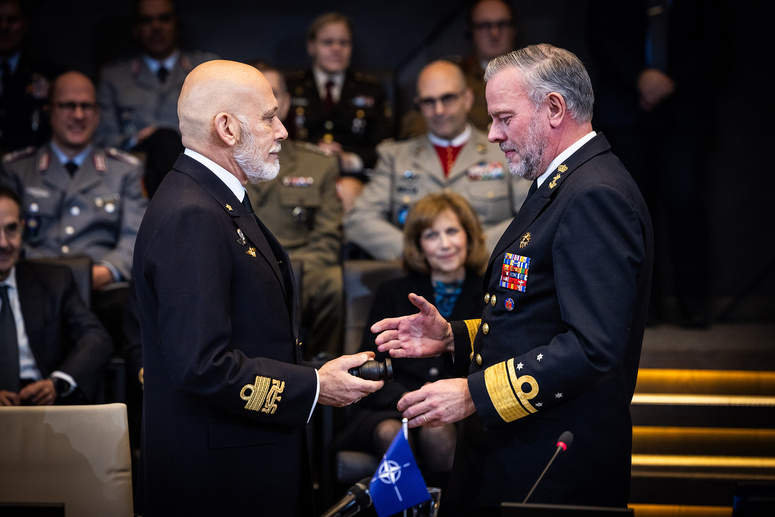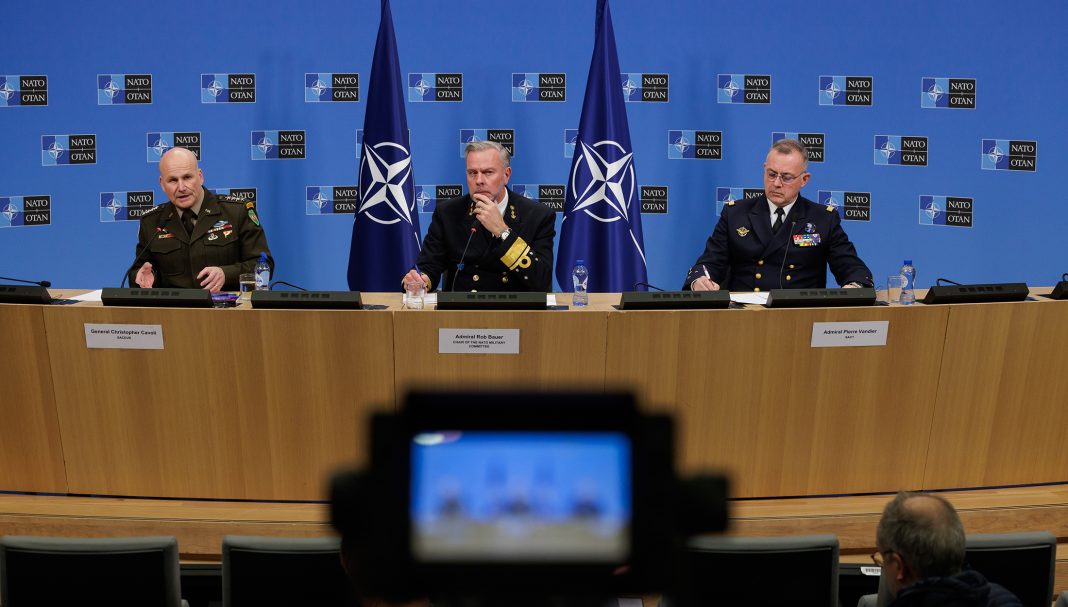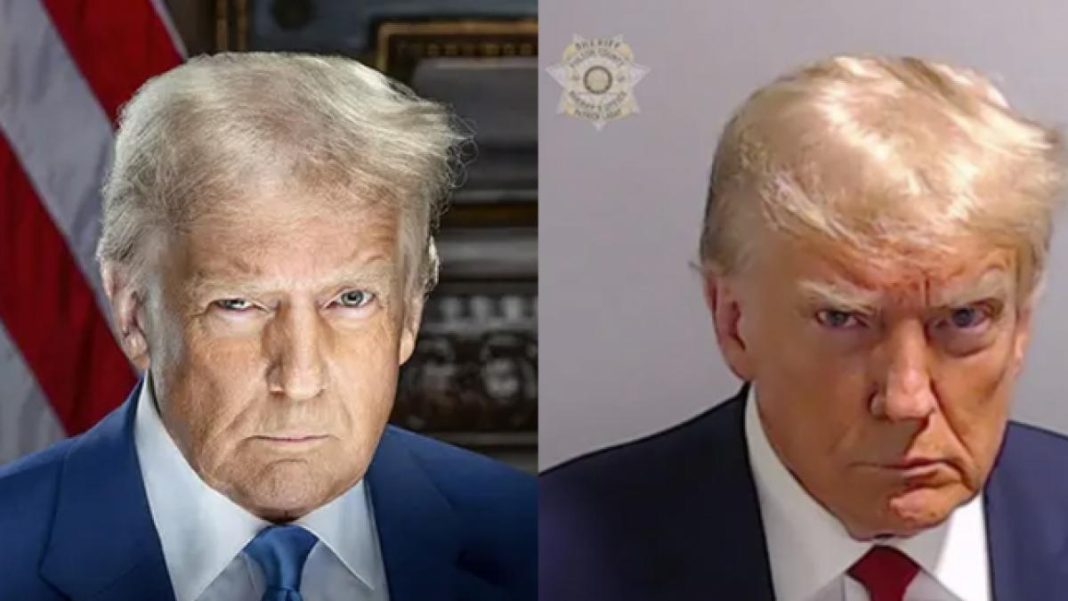La conferința de presă comună susținută de către Președintele Comitetului Militar al NATO (CMC), Amiralul Rob Bauer, Comandantul Suprem al Forțelor Aliate din Europa (SACEUR), Generalul Christopher Cavoli și Comandantul Suprem Aliat pentru Transformare (ACT), Amiralul Pierre Vandier s-au făcut precizări extrem de importante pentru apărarea și securitatea aliată.
Jurnalista Teri Schultz l-a întrebat pe Amiralul Bauer : V-am întrebat în trecut despre apelul autorităților suedeze pentru cetățenii lor de a se pregăti de război și ați spus că și alte țări ar trebui să-și pregătească propriii cetățeni în acest fel. Ați văzut că acest tip de urgență a crescut printre alte țări din Alianță, pregătind societatea pentru, vreau să spun, nu doar un posibil război, ci și potențiale dezastre naturale? Și celălalt lucru pe care l-ați spus a fost că industria a trebuit să înceteze să mai fie „doar suficientă, la timpul potrivit”.
Amiralul Rob Bauer, CMC :
Despre pregătirile pentru război. Este un apel pe care Secretarul General Rutte l-a lansat acum câteva săptămâni în discursul său de la Carnegie Europe. Este ceea ce am spus și acum un an. Cred că este o vorbă foarte veche: „Dacă vrei pace, pregătește-te de război”. Și cred că este exact ceea ce trebuie să facem. Unii oamenii mă numesc războinic, dar de fapt este exact opusul. Faptul că te pregătești pentru război în mod corect, atunci îi descurajezi pe inamici mai bine. Iar dacă îi descurajezi pe dușmanii tăi mai bine, posibilitatea să existe război dispare.
Deci nu este, să spunem, o pledoarie pentru război, este o pledoarie pentru pace și asta necesită investiții la o scară mult mai largă doar pentru forțele armate.
Pentru că, dacă te uiți la descurajare, este vorba și de securitatea energetică; este vorba despre securitatea alimentară; este vorba de reziliența oamenilor.
Societățile se gândesc la faptul că, într-o criză, ai nevoie de trupe noi după câteva zile. Nu este vorba doar de grenade noi și tancuri noi. Este vorba și despre noii militari, așa că trebuie să te gândești la sisteme în care ești rezistent.
Și dacă toate aceste lucruri sunt rezolvate, mai este vorba și de materii prime, că nu suntem dependenți de o singură națiune, așa cum am văzut cu Rusia, gaze și petrol, așa cum vedem acum cu China, când vine vorba de materii prime, pentru energie regenerabilă. Sau pentru anumite medicamente.
Suntem foarte dependenți de China. Cred că nu e bine. Nu sunt împotriva Chinei, dar nu este bine că depindem de o singură națiune pentru acele provizii.
Deci pentru toate acestea trebuie să facem mult mai mult. Întrebarea a fost: „Se întâmplă asta?” Văd că se întâmplă din ce în ce mai mult. Se discută din ce în ce mai mult despre asta, nu numai în Suedia. Se întâmplă de mai mult timp în națiunile scandinave. Discuțiile au loc în Germania. În propria mea națiune (nr Olanda), există mai multe discuții despre asta.
Așadar, cred că acest lucru este important pentru a construi reziliența societății. Acesta este un aspect. Și industria face parte din asta. Industria face parte din reziliența societății. Și economiile de tip „doar la timp, cât e nevoie” pe care le-am creat în ultimii 40 de ani nu mai sunt suficiente pentru o pandemie și nu mai sunt suficiente în caz de război.
Trebuie să fim capabili să răspundem vârfurilor de cerere la criză. Și iată că nu se întâmplă asta, acum.
Trebuie să ne creștem propria capacitate de apărare, asta este una.
În același timp, putem ajuta Ucraina investind în capacitatea disponibilă în Ucraina, investind bani pentru a face capacitatea de acolo să funcționeze pentru ei. Pentru că ceea ce le lipsește sunt banii, nu capacitatea în sine.
Ei au fabrici, dar au nevoie de bani pentru materii prime etc. Deci cred că este ceva la care ne uităm ca Alianță, dar este ceva la care trebuie să lucrăm pentru încă mulți ani, pentru a ne îmbunătăți reziliența societăților noastre.
#NATO
Si vis pacem, para bellum. Dacă vrei pace, pregătește-te pentru război.
Este un vechi proverb latin.
Expresia are următoarea semnificație : o societate puternică este puțin probabil să fie atacată de către dușmani.

Question: Teri Schultz. You’re giving it to me? Sorry, my voice is not good, guys. Okay, I’m going to give one to each of them, because Leo can’t get mad at me anymore. First, of course, Admiral Bauer, I’m thinking back to a year ago, when we were here, exactly at this press conference, and giving you a chance to reminisce a little bit. At that time, I asked you about the Swedish call to prepare for war to its citizens, and you said you go to the other countries would train their own citizens in this way. Have you seen that sort of urgency picked up among other countries in the Alliance, preparing society for, I mean, not just possible war, but also potentially natural disasters? And the other thing you said was that industry had to stop being “just enough, just in time.” I think that was your statement. General Cavoli, you said that you were quite confident that no matter what happens with the Trump administration and Ukraine, supply would be okay. But what about your own situation with the Family of Plans? You have organized everything to such great detail, not that I’ve seen it, obviously, but so we hear. Are you worried that if the US pulls back even a little bit, it will disturb the balance that you’ve created in these new plans? And Admiral Vandier, the United States, the Biden administration were worried about Trump tariffs. They have just decided that many, many NATO allies, the Eastern Europeans, will have a limit on how many microchips they can buy, AI microchips, because they’re worried about China’s weapons industry. But what does that do to innovation in the Alliance. Is this something you’re worried about? Thank you.
Admiral Rob Bauer: Okay, on the preparations for war. It’s a call that Secretary General Rutte put there out there a couple of weeks ago in his speech for Carnegie Europe. It is what I said a year ago. I think it’s a very old saying, “If you want peace, prepare for war.” And I think it is exactly what we need to do. And then people call me a warmonger, but actually it’s the opposite, the fact that if you prepare for war in the right way, then you are deterring your enemies better, and if you deter your enemies better than the chance there will be war goes down.
So it’s not, let’s say, a plea for war, it is a plea for peace, and that requires investments on a much wider scale than just the armed forces. Because if you look at deterrence, it is also about energy security; it is about food security; it is about the resilience of the people. Societies think about the fact that in a crisis, you need new soldiers after a couple of days. It’s not only about new grenades and new tanks. It’s also about new soldiers, so you have to think about systems where you are resilient. And if you all have arranged that, it’s about raw materials, that you are not dependent on one nation only, like we saw with Russia, gas and oil, like we see now with China, when it comes to raw materials, for renewable energy or for certain medicines. We are heavily dependent on China. I think it’s not good. I’m not against China, but it’s not good we are depending on one nation for those supplies.
So all that, if you take that into account, we need to do much more. Your question was, “Is that happening?” I see it happening more and more. There is more and more discussion about it, not only in Sweden. It is happening in the Scandinavian nations for a longer time. The discussions in Germany are happening. In my own nation, there is more discussion on this.
So I think this is important to build up the societal resilience. That’s one, and industry is part of that. Industry is part of societal resilience. And “the just in time, just enough” economies we have created over the last 40 years is not enough for a pandemic and not enough for a war.
We need to be able to respond to peak demand signals, and that’s not the case. Now, we have to increase our own defence capacity, that’s one and at the same time, we can help Ukraine by investing in the capacity that is available in Ukraine, by investing with money to make that capacity that is there work for them, because what they lack is money, and not the capacity itself. They have the factories, but they need the money for the raw materials, etc. So I think that is something we are looking at as an Alliance, or as Allies as well, and the combination will improve, but it’s something we need to work on for many more years to improve our societal resilience.
https://www.nato.int/cps/en/natohq/opinions_232213.htm?selectedLocale=en
Amiralul italian Cavo Dragone este de azi noul Preşedinte al Comitetului Militar NATO






